On a recent afternoon three retirees, Ljubo, Miladin, and Vlado, were hanging out at the Foča town square, catching the last rays of sun before the long winter. A cat joins. “Take a photo of the kitty, too. She’s like a pensioner. Just like us. She’s poor,” Miladin said.
“The cat’s doing better than you and me, though,” one of his friends said. “She has something to eat every day.”
Foča is a town of 40,000 people in eastern Bosnia. The entity Foča is located in, Republika Srpska, has nearly the same number of workers and pensioners — 275,000 of the former and just 2,000 fewer of the latter.
Most of the daughters, sons, and grandchildren of Miladin and his friends have moved to Serbia. “Of course, I miss my granddaughter, but she won’t be coming back. All the girls from here who were good students are now in Belgrade or Novi Sad. And they’re going to get married there,” Ljubo said, adding that poverty and political issues have been driving people away.
Ljubo took up arms in the war as a 35-year-old. He said those were the best years of his life, his prime. “Now I’m disabled. What should I expect?”
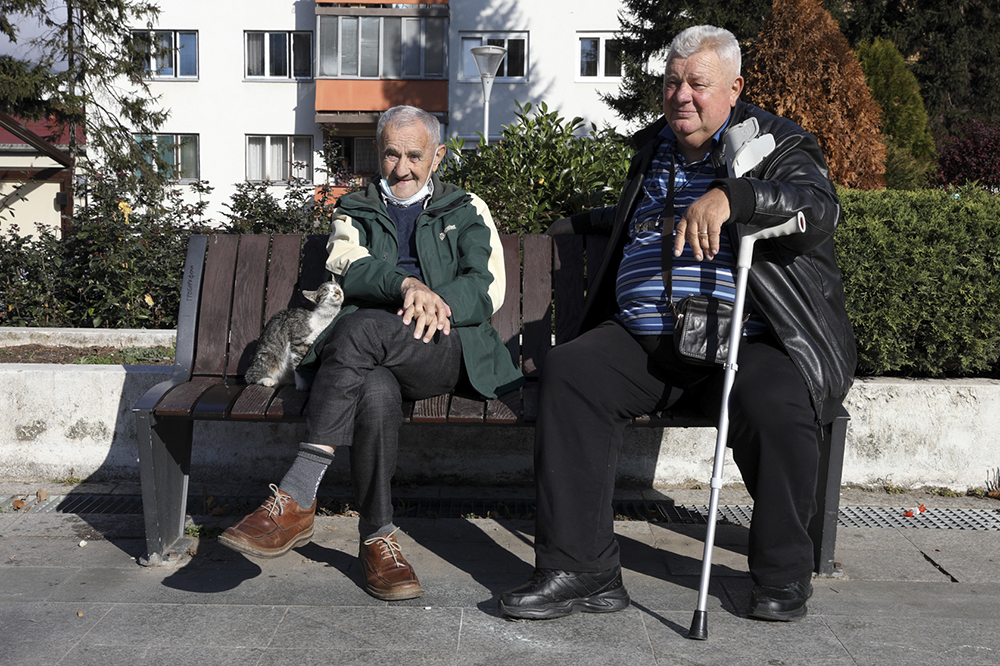
Ljubo, Miladin and Vlado, war veterans from Foča, today survive on small pensions. Their families largely left Bosnia searching for a better life. Photo: Adi Kebo.
More than 25 years since the end of the war, he is again hearing of war, conflicts and hate. “But the people who spread such rumors didn’t even fight in the war,” Ljubo said. “They weren’t fighters, they didn’t defend the country, it wasn’t them. It’s the deserters and criminals, all of them, no need to call them out name by name.” Things should have gone differently, the three men said, but note that they do not have a say.
“Who does have a say?” one of them asked before answering his own question. “Rich men. Rich people. The deserters who call the tune here in Foča. Everything belongs to them. They earned some of what they have, some of it they stole.”
All three of them agree that there is no unrest among the residents of Foča since sabre-rattling only suits the politicians in power. “Why would I be scared? I think people don’t want to go to another war. And the politicians can’t fight it. All this is just self-interest. They want to cover up their theft. They’ll have to justify the enormous amount of money they’ve stolen,” Ljubo said.
The children of these three pensioners are a small part of the army of people who have left Bosnia and Herzegovina (BiH). According to official records, more than half a million people emigrated in the last six years. The pandemic slowed the exodus in 2020, but not for long. This year, the trend continued. In the first six months of 2021, 85,000 people left the country.
Exodus
While BiH is dying demographically, government officials are focused on war themes and talk of the disintegration of the country. Milorad Dodik, member of the tripartite Bosnian presidency and the most powerful leader in Republika Srpska, in the middle of this year again began talking about the entity gaining independence. His most recent agitation for independence began after the then high representative for BiH, Valentin Inzko, enacted a law prohibiting genocide denial in BiH.
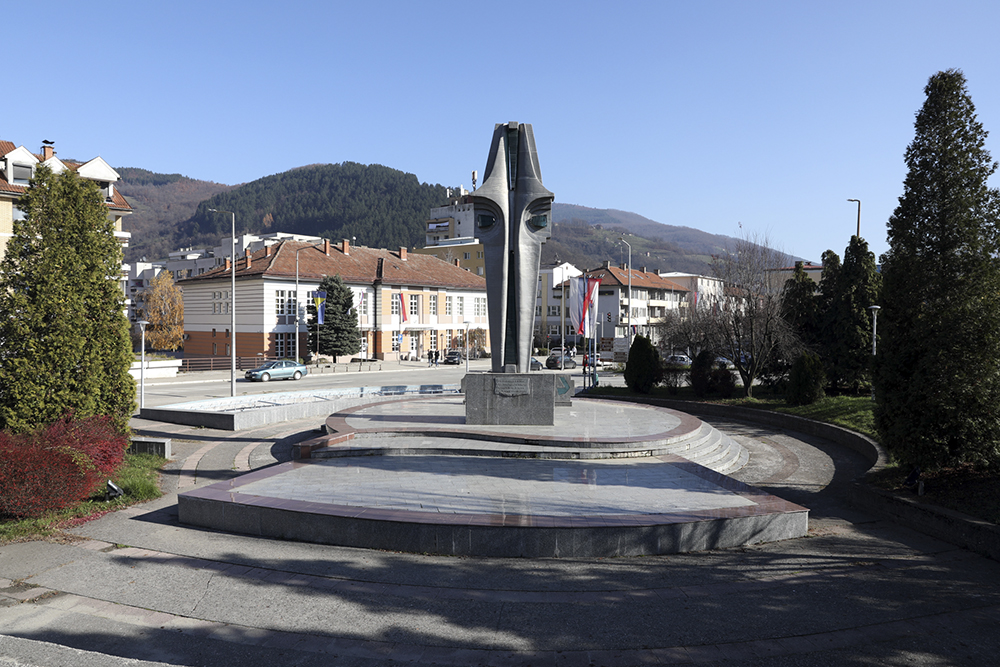
Foča was once a vibrant city, but much of its population was expelled during the war. Many of those remaining are impoverished. Photo: Adi Kebo.
More than 25 years after the war, the country remains a semi-protectorate created through the Dayton Peace Agreement. Bosnia consists of two entities: the Federation of BiH and Republika Srpska, plus the Brčko District. Each unit has its own president, assembly, ministers and so on. Although representative democracy is in place, the high representative has the power to overrule elected officials. The position has been continuously held by diplomats from the EU, who are appointed by the UN Security Council.
Bosnia has once again found itself in the international headlines.
Inzko left the country after he introduced the law on genocide denial. Then a new high representative was named and politicians, both local and international, began talking about a new war, all a year before general elections. Bosnia once again found itself in the international headlines, and shuttle diplomacy was launched along with talks on potential changes to the Constitution and Electoral Law.
While politicians negotiate, the people emigrate. Those who stay struggle to survive.
The demise of Bosnian society can be seen in recent school enrollment numbers. For example, compared to eight years ago, in the most recent school year, 3,498 fewer students entered the first year of primary school. In Modriča, a municipality in northeastern BiH with 25,000 residents, not a single student enrolled at the local high school last school year. Five students signed up, but teachers advised them to consider vocational schools or high schools in another city.
Ranting about the past is played out
Tijana and Tamara live in Foča and are among the few young people out on the streets one afternoon. For now they aren’t planning to emigrate. Both 18, they are seniors at the Language High School in Foča.
“Everything’s alright, but we aren’t really good with languages, and languages are the most important thing,” they laughed. When asked why they chose the Language High School, they said options for secondary education in Foča are limited. There is a general education high school, a language high school, and vocational schools for forestry, medicine and mechanical engineering.
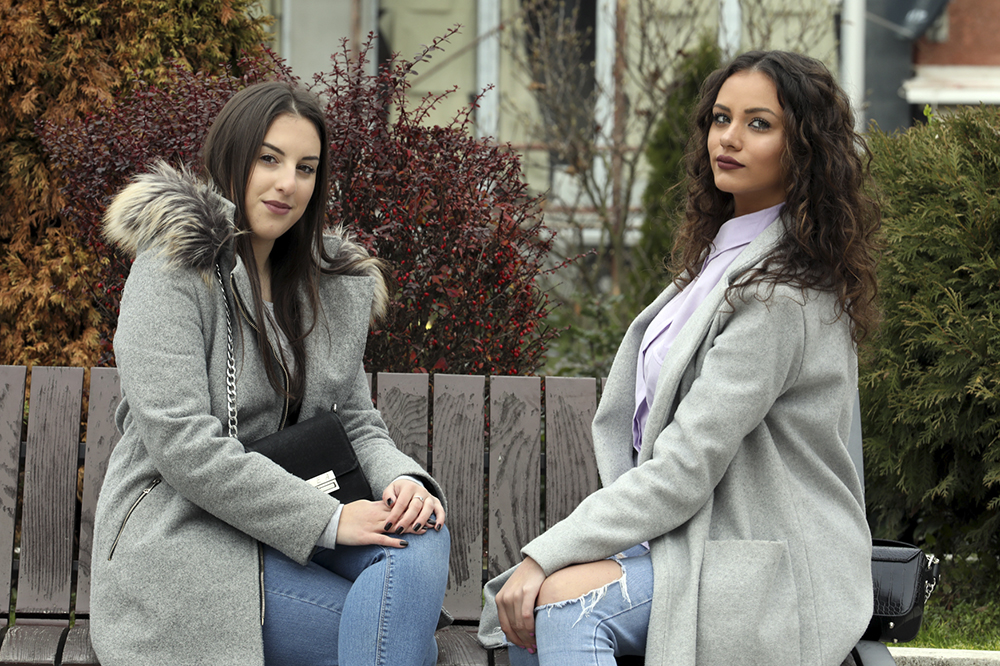
Tijana and Tamara, both 18 years old, want to stay in Foča. The past doesn’t feel relevant or interesting to them. Photo: Adi Kebo.
They said that the subject that occupies the older generations in Foča, the past, is of little importance to them. As with other teenagers, they are into music, film and fashion. “Ranting about the past is played out,” Tijana said. “Only someone interested in history would want to deal with it, but we don’t.”
Their ambition is to build a life for themselves in Foča, perhaps go to university in Pale, and then return to their hometown.
"No one cares about politics anymore. People focus on themselves and their own livelihoods."
Nebojša, Foča
Tijana’s father, Nebojša, said that he would love it if she and her brother stayed in Foča. When the war in BiH ended, the city was in ruins, there weren’t any jobs. Nebojša worked in construction, as a waiter, and worked summers on the Montenegrin seaside. Now employed at the Foča Penal and Correctional Facility, he thinks the circumstances are better than 20 years ago. This is why Nebojša would like his children to stick with their family. “It’s better for them here,” he said, “they should fight like we do.”
Nebojša and his wife Milena were jobless after they got married. Today both are employed; they have their own house and a car. They’re satisfied, they said. “No one cares about politics anymore. People focus on themselves and their own livelihoods,” Nebojša said.
But war is still discussed in whispers. A next-door neighbor of the family, who didn’t wish to state his name, said that he had been a member of the Army of the Republika Srpska but that we wouldn’t fight in another war. “That’s what everyone will tell you,” he said.
“Why? Because it’s utter nonsense. Someone turns you against another and you only end up losing your loved ones. I was young and I didn’t know better, you simply had to join. You were there, so you had to. In the end, I realized that it was a mistake, a blunder, and now it’s us who are paying the price,” he said.
Confronting the past
Before the war, until 1992, Foča was home to more than 20,000 Bosniaks. After a series of brutal war crimes, today only 15 Bosniak families live in the town, while 137 more live in nearby villages. Only eight Bosniak children attend school in the area of Foča. Only three of these attend school in the city, all of whom are the children of local Islamic clerics.
The main gathering place for Bosniaks during holidays and prayers is the Aladža Mosque, which was destroyed during the war. The mosque was rebuilt and reopened in 2019. Fadil Arifović, the imam of the mosque, said that locals rely on each other without any prejudice or tensions.“The main problems here are economic,” he said, adding that he does not know how people manage to make ends meet.
“Foča is in the backcountry of eastern Bosnia. We get a little tourism while the season lasts, some rafting, camping and hiking to the Maglić and Zelengora mountains. But winters are eerie,” he said. “Not only is there a lack of Bosniak returnees, but also a lack of Serbs.” Most people go to Serbia or somewhere in the west because they see no prosperity in Bosnia, Arifović said.
Imam Arifović said that a number of locals believe that the rhetoric now dominating BiH is just part of pre-election campaigning and a trick used to conceal crime and corruption.
Having previously lived in Jeleč, a nearby village, Arifović moved to Foča 14 years ago to work as an imam. He said that imams offer support in many ways, especially in returnee communities; imams end up serving as psychologists, drivers and medics.
Imam Arifović said that a number of locals believe that the rhetoric now dominating BiH is just part of pre-election campaigning and a trick used to conceal crime and corruption. However, many are scared. “There are some people who are scared, practically in hysterics. They are bombarded with all sorts of information and it takes a toll,” he said, adding that he is feeling unsettled too. “However, I can tamp it down. Those who passed through prison camps and other horrors, it’s hard to calmly reason with them. Some think it’s all absolutely harmless, others would flee Foča today if they could.”
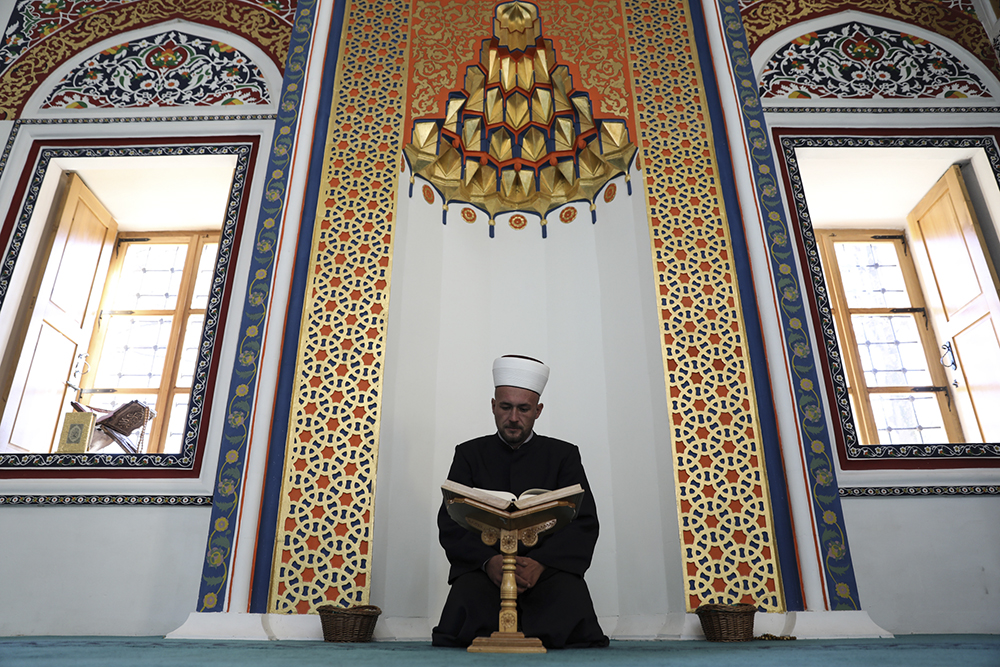
Imam Fadil Arifovic is much more than a religious leader for the small community of Bosniaks who came back to Foča. Photo: Adi Kebo.
Most Bosniaks in Foča are elderly and remember what happened there almost three decades ago. There is much in the city to remind them, including fragments of the Aladža Mosque’s original stones that are now on display in its courtyard. The stones were salvaged after the Missing Persons Institute received information about a mass grave in the Drina River.
The first excavator’s probe into the river immediately turned up stones from the destroyed mosque. The excavation work was soon stopped, but the stones were turned over to the mosque. “A lot of it is still in the Drina, never to resurface again,” Arifović said.
A soup kitchen for babies
There were once multiple sawmills operating in Foča. Thousands of workers and their families lived off salaries earned there. Today these facilities are no more. Residents of Foča now find jobs in supermarkets, bettings shops, cafes and a few tourism businesses, as well as in the public sector, particularly attractive employment in BiH.
The pensioners gathered at the central town square said they are doubtful about estimates that say the average pension is 500 marks, or roughly 250 euros.
“The average pension here is 300 marks,” one of the retirees said. “I don’t go shopping for groceries, but this one man who does told me that the prices are up 30%, while the pensions have increased by only 2%. Some are buying ten eggs and a kilo of bread on credit.”
The families come down from remote villages in the Srebrenica area, walking up to two hours in order to receive milk, porridge, cornmeal and semolina.
People in other cities in BiH live similarly. In some parts the situation is worse. In Bratunac, eastern Bosnia, the first soup kitchen for babies was recently opened.
Aida Sadiković Mehonić is the long-time head of the Sarajevo-based association “Obraduj nekoga” (“Make someone happy”). As part of the project “Idemo na babine” (“Let’s go to a baby shower”), members go across the country visiting the households of babies from impoverished families.
As soon as the facility opened they added 30 babies to the list of beneficiaries with the help of social welfare centers. Soon they signed up 12 more. The families come down from remote villages in the Srebrenica area, walking up to two hours in order to receive milk, porridge, cornmeal and semolina. Due to the distance, some come once a month, while others who live closer come on a daily basis.
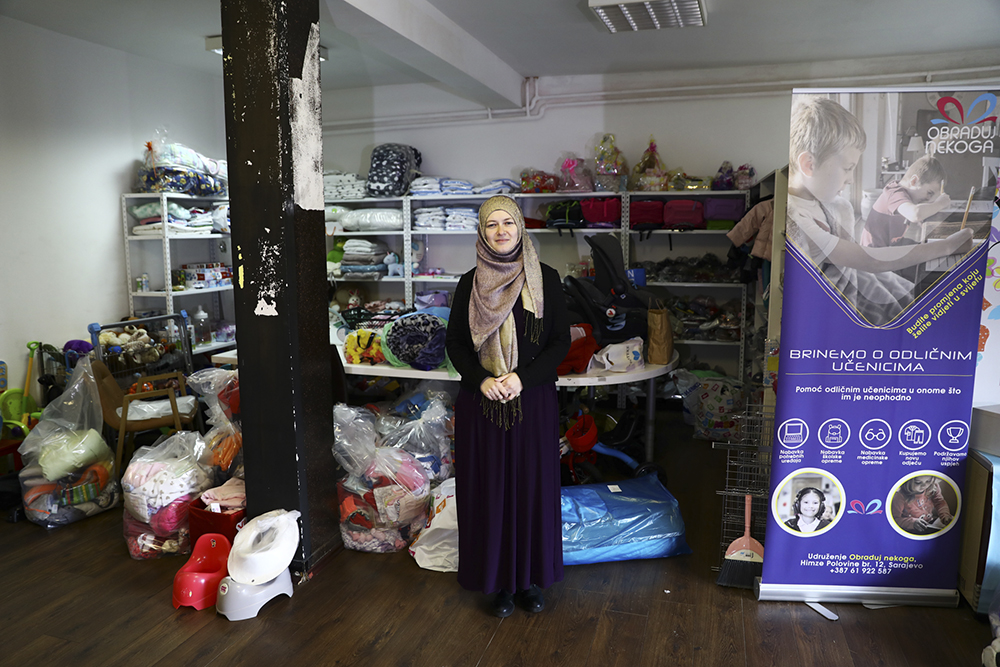
Aida Sadiković Mehonić runs a charity helping families with baby supplies. Some of the beneficiaries come from remote villages around Srebrenica. Photo: Adi Kebo.
“We didn’t have the faintest idea how necessary such a kitchen was until we opened it,” Sadiković Mehonić said. “In bigger cities we may not be aware of it, but it’s so tough in the villages.”
She said she is often asked about the dignity of the beneficiaries and how she manages to protect their identity while collecting the necessary supplies and money. Her answer is that there is no more dignity left in Bosnia.
“We’ve had cases where people would beg us to film them so that other people could see them and potentially help out,” Sadiković Mehonić said. “People want to tell the truth, to say that they have no bread to eat, so from day to day people’s shame and dignity drop, all because of the country we live in.”
Forgiveness is the only option
Intertwined with the legacy of war, the stories of everyday hardships can be found anywhere in Bosnia. One of those stories is that of Zijo Ribić from Tuzla, whose entire family was killed in the war.
Ribić’s parents, sisters, brother, and relatives were all murdered in the village of Skočić. Only eight at the time, Ribić survived, even though, as he says, he should have been dead. He was stabbed in the neck and then thrown into a pit that was later turned into a mass grave. Ribić regained consciousness before it was filled in and somehow managed to escape.
Before he was wounded, Ribić asked the perpetrators if he could join his nine-months-pregnant mother. “You’ll be joining her now,” they told him before they took him off a truck, stabbed him and threw him into the pit.
"We can't make it through a month on my salary, but thanks to the help we get from our friends abroad, we can manage."
Zijo Ribić, Tuzla
“Zlatija, Ismeta, Zlata, Suada, Zijada, Almasa…”, Ribić recalled his sisters’ names. “I was the youngest one until Sabrija’s birth in 1990.” His entire family — including his 33-year-old father Ismet and 29-year-old mother Ševka — was killed within 24 hours.
In 2018, the Court of Appeals in Belgrade upheld the acquittal of the members of the unit Sima’s Chetniks, who were charged with the demolition of a mosque and murder of 27 Roma civilians in the village of Skočić near Zvornik in July 1992. Even though the victims were Bosnian nationals and the crime was committed on the territory of BiH, the country’s political leadership did not respond to the court decision.
“No one in my country — including the members of my people and local political leaders — has condemned the verdicts. In Bosnia, the Roma are unrecognized. We’re treated almost like animals that you can kill with impunity,” Ribić said with indignation.
As a victim of war, he was granted a flat by the state. Married with a four-year-old daughter, Ribić works in a kindergarten kitchen in Tuzla. His wife is unemployed, despite having applied for many jobs through the years.
“We can’t make it through a month on my salary, but thanks to the help we get from our friends abroad, we can manage,” Ribić said. “It’s not a lot, but it’s just enough for me to get the most important things for my kid.”
Ribić talks about the war often, which is why he is often invited to international events as a speaker. He discusses not just what he lived through, but also the need for forgiveness and the struggle against hatred.
“Recently, I was at the Vatican, where I gave a speech in front of 200 world leaders; [Angela] Merkel was there, too,” he said. He told them that his position is that life must go on without hatred “because forgiveness is the only way forward.”
“If I hadn’t forgiven, I would hate some other ethnic group and I’d pass this hatred onto my child, my friends, and my enemies. What would be the outcome? New conflicts and wars, more misery and orphans. Instead, I’m trying to push for change here — my friend Almir Arnaut Beli and I do it as part of our association ‘Velika djeca’ (“Big Children”),” Ribić said. However, he said that the prolonged and escalating crisis in BiH is weighing him down. But just like the people in Foča, he does not believe in the possibility of a new conflict.
“If a new conflict does break out, it will be between the rich and the poor because more than 90% of the population is poor,” he said. “The rest of those in power have made a fortune, while common people send their children to foreign countries.”
Closed factories
The factories that once guaranteed the livelihoods of local families were largely closed or privatized after the war, in a process which left many jobless. Medina Alić used to work at the Unis ball bearing factory in Vogošća, a suburb of Sarajevo where she lives to this day. Alić has two grown children and five grandchildren. For years now, her daughter and son-in-law have been working on ships across the globe. Each journey usually lasts three months, but Alić’s son-in-law was recently gone for nearly half a year.
According to court records, as many as 135 businesses in BiH shut down this year between October 20 and November 11.
“The children need their parents, of course, but now they’ve found their safe haven in us,” said Alić, who looks after her grandchildren while their parents are away. “The people who are leaving the country have a rational way of looking at things — it’s better to work as a cleaner for 2,000 marks than for 500”, she said, referring to the fact that for the same job, people are better paid outside the country.
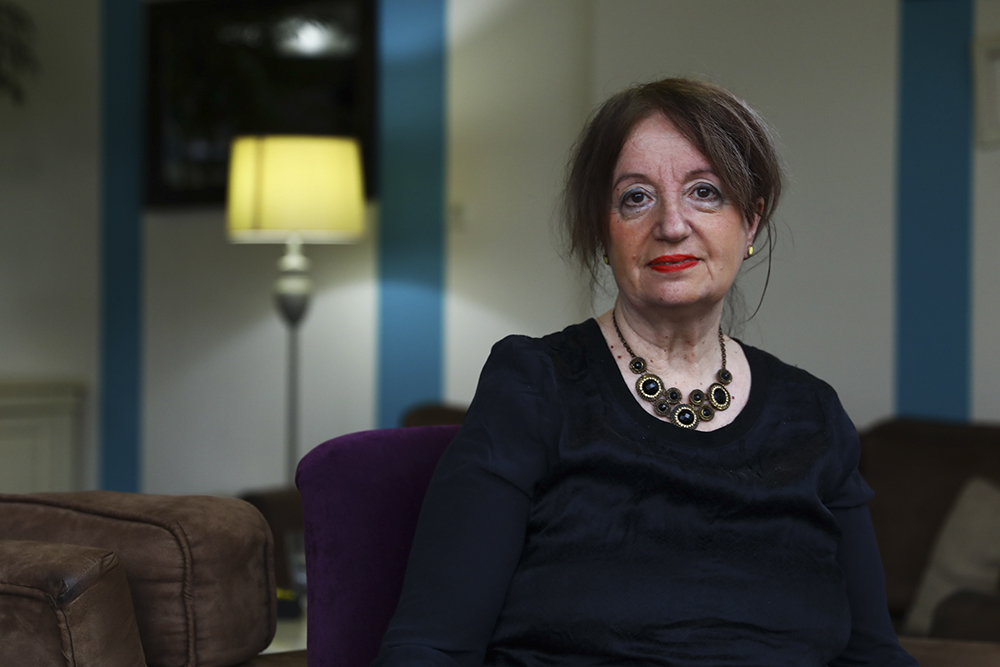
Medina Alić, a former worker at the Unis ball bearing factory, takes care of her grandchildren whose parents work abroad. Photo: Adi Kebo.
The already unfavorable business environment has been made worse by the ongoing pandemic. Small businesses are particularly vulnerable and are closing every day. Those that survive are often in debt and face an uncertain future. According to court records, as many as 135 businesses shut down this year between October 20 and November 11. On July 31, the the Labor and Employment Agency of BiH published data showing that just under 400,000 people were registered as unemployed — 1,600 more than in June 2021.
Due to complicated obligations to the state and limited support, people like Slobodan Bjelović, an entrepreneur from Sarajevo, has been struggling to pay his employees on time each month while still fulfilling other legal obligations.
“The state goes out of its way to keep potential investors out of BiH. At the same time, people are trying to leave the country, or to get their children to leave,” Bjelović said. “The gist of everything is to make up various scandals because [politicians] don’t know how to improve our living standard. All levels of government are rife with illiterate people who use their positions to become rich in the blink of an eye. Who cares what happens tomorrow?”
One day, he warns, such a system is bound to crash.
Feature image: Adi Kebo.


This article has been produced with the financial support of the “Balkan Trust for Democracy,” a project of the German Marshall Fund of the United States and the Norwegian Ministry of Foreign Affairs. Opinions expressed in this article do not necessarily represent those of the Norwegian Ministry of Foreign Affairs, the Balkan Trust for Democracy, the German Marshall Fund of the United States, or its partners.








